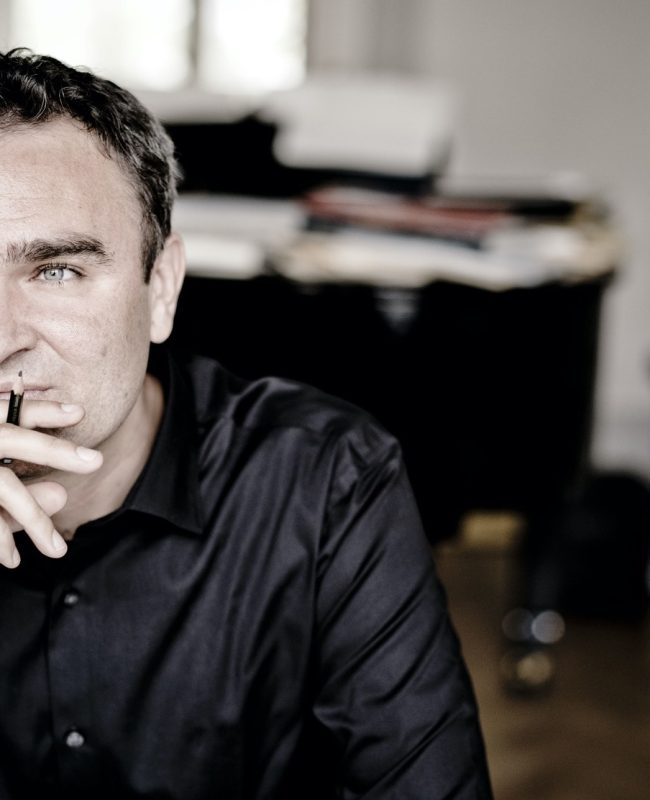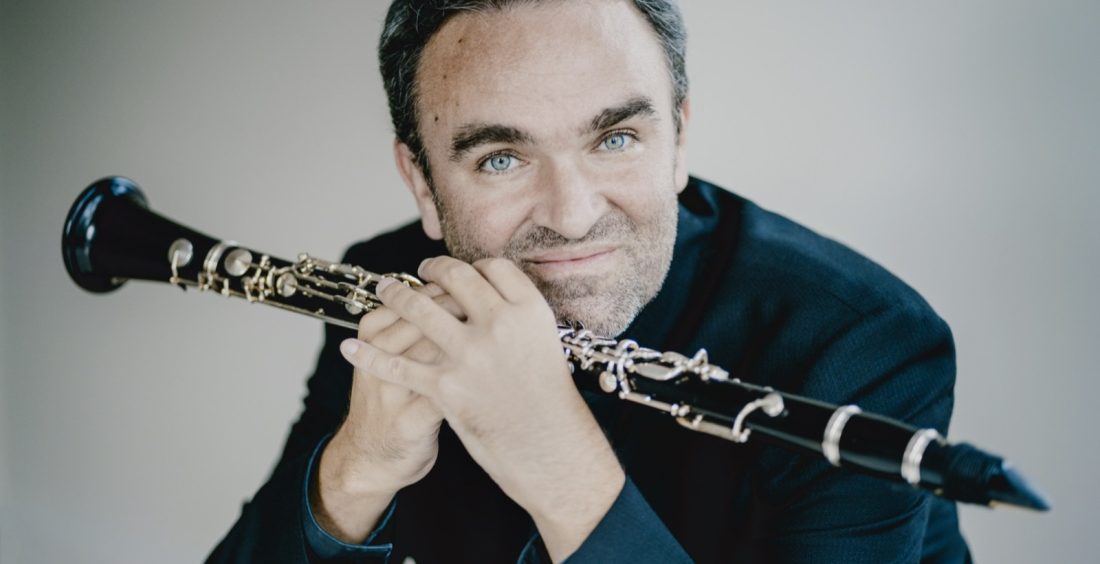During the Chamber Music Weekend he will appear at St Agnes’ Convent, first with the superb Schumann Quartet (22 May), then in a recital with Russian pianist Denis Kozhukhin (23 May). His residency will culminate in a performance of Mozart’s Clarinet Concerto in A major with the PKF-Prague Philharmonia headed by its Chief Conductor Emmanuel Villaume (31 May). He will also be giving a master class as part of his residency (30 May).
Born in Munich, Widmann’s route to composition led via his clarinet. He grew up in a musical family and his earliest memories are of his parents’ home music-making and a trip to the opera, where he heard Der Freischütz. To this day Weber is an absolute favourite of his, as attested by his Prague Spring concert with Denis Kozhukhin, and the album released in 2020 on the dynamic Alpha Classics label dedicated to this early Romantic.
Widmann began to play the clarinet at the age of seven, and as soon as he had managed to coax a few notes from the instrument, he began to improvise. Widmann himself stated that his desire to compose was born of the sorrow he felt for these forgotten improvisations. His memory wasn’t serving him well enough, so he finally got himself some manuscript paper.
In addition to his clarinet studies in Munich and later in New York at the prestigious Juilliard School, he sought consultation in his compositional endeavours from such heavyweights as Hans Werner Henze, Wolfgang Rihm and Heiner Goebbels. He had always admired Helmut Lachenmann and later met Pierre Boulez as well. Unlike his contemporaries, who had posters of David Bowie and Michael Jackson in their rooms, young Jörg had Pierre Boulez on his wall. And while Germany’s young generation cultivated and embraced the emerging techno scene wholeheartedly in the early Nineties, 20-year-old Widmann was diligently composing and, inspired by this pulsating rhythmic genre, he came up with the piece 180 beats per minute. He apparently never attended any techno gigs; what was far more important for him was the unusually rich and colourful musical history of the genre to which he dedicated his life and his music. His works reflect an intricate web of characteristic gestures, intimated, vague quotations, respectful nods to the past, and sly references ranging from Bach to his own contemporaries. “Jörg Widmann is very much a child of our time. Everything is accessible, and he takes in these influences. So his music can be chaotic when you first hear it, it’s complex, it can be very melodic, it can even be kitschy sometimes. But it’s done with a purpose.”
These were the words pronounced by Austrian conductor Franz Welser-Möst when he conducted Widmann’s Trauermarsch in Carnegie Hall in 2009, expressing the reasons for the artist’s renown as a composer. Now forty-seven, Widmann has seen his music appearing regularly on the concert programmes of traditional symphony orchestras over the last few years – the Berlin and Vienna Philharmonics, the BBC Symphony Orchestra and many others. The Czech Philharmonic has performed his work as well. We will frequently also find his name on programmes for concerts given by ensembles specialising in contemporary music, such as Ensemble Intercontemporain and Klangforum Wien, to mention two high-profile chamber orchestras. He has published more than 100 of his compositions, including twenty orchestral works, around ten instrumental concertos, and a full-length opera, Babylon.
If there’s a simple explanation for Widmann’s openness to influences from the past – take his Con brio, for instance, which quite clearly manifests the ethos of Beethoven’s Seventh and Eighth Symphonies – it seems to lie with his parallel stellar career as a clarinetist. He has performed chamber music with the likes of András Schiff, Daniel Barenboim and Mitsuko Uchida. As a soloist he has appeared with the Gewandhausorchester Leipzig, Orchestre National de France, Tonhalle-Orchester Zürich and the Vienna Philharmonic. Moreover, many composers have written works expressly for him, such as his mentor and teacher Wolfgang Rihm, Mark Andre, or Czech composer and member of the Prague Spring Artistic Board, Miroslav Srnka.
“How does one cope creatively with the pressure of that long classical tradition?” asks The Guardian. “I’m humble,” he states with an awkward grin. “As a player, I’m in touch with these masterworks every day. I love them! So I write pieces about my love.”
As one might surmise from his Prague Spring concerts, the essence of Widmann’s individuality is chiefly rooted in his regard for the legacy of the Classical and Romantic composers. The fervour and passion with which he speaks of the music of Weber, Mendelssohn, Schumann or Mahler is infectious. His profound knowledge of the Classical repertoire is inspirational. The expression of humility conveyed to The Guardian is not exaggerated: He received requests to write a clarinet quintet on many occasions, but he long declined the offers – he regards Mozart’s and Brahms’s quintets as works of genius and he felt he should first mature as a composer before embarking upon a piece for the same instrumental ensemble. His love for the German Romantics is also reflected in the titles of his works – the trilogy for orchestra Lied, Chor and Messe, Trauermarsch for piano and orchestra, which he wrote for pianist Yefim Bronfman, or Teufel Amor [Devil Cupid], a large-scale orchestral piece, inspired by a fragment of Schiller’s poem of the same name, which reads: “Sweet Amor, remain in melodic flight”. Widmann interprets the line of verse by stating that, in love, as in music, we try to capture something indefinable, something that goes beyond us and brings us to wonderment and also to despair. Such is the mystery of life and art.









